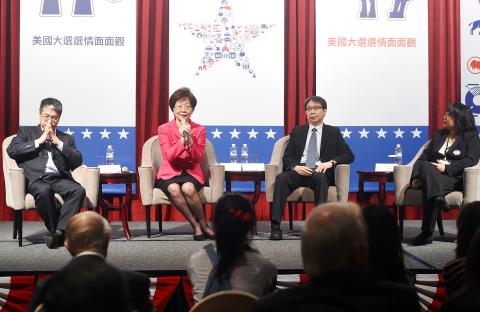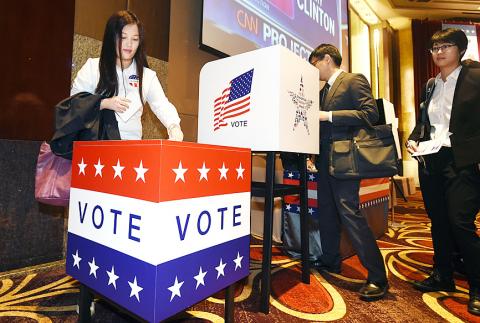US president-elect Donald Trump’s upset win drew mixed reactions from academics and non-governmental organization (NGO) leaders yesterday, from speculation about new arms sales to Taiwan to concern over Taipei’s quest to join the US-led Trans-Pacific Partnership (TPP).
A crowd of several hundred reporters, academics and NGO officials gathered for a US presidential election watch event organized by the American Institute in Taiwan (AIT) and Taiwan Democracy Foundation in Taipei, milling through a Shangri-La Far Eastern Hotel ballroom while watching broadcasts of the election.
As servers bedecked in US flag-themed costumes served refreshments, the tension in the room rose as a tight race became apparent.

Photo: Liao Chen-huei, Taipei Times
While a mock poll of participants conducted by the AIT showed a small majority would have voted for Democratic US presidential candidate Hillary Rodham Clinton, participants gave widely varying responses when asked about their perception of the consequences of the election results for Taiwan.
“In Taiwan, political hands in both parties are very familiar with Clinton’s aides, so if she were elected, they would feel more at ease,” Tamkang University professor Alexander Huang (黃介正) said. “If Donald Trump was elected, there is going to be a lot of homework not only for us, but for the whole region, and there is a lot that is hard to predict.”
Lai I-chung (賴怡忠), an executive committee member of the pan-green Taiwan Thinktank, said Taiwan-US relations would remain stable, with the possibility of some new arms sales because of Trump’s emphasis on allies’ self-defense.

Photo: Liao Chen-huei, Taipei Times
“The US’ foreign policy is not just the product of whatever the president says,” Lai said. “While it is still unclear what the content of Trump’s foreign policy will be, we will still have a strong Republican congress, as well as the Taiwan Relations Act and the ‘six assurances,’ so the basic structure of Taiwan-US relations should not change much even if Trump has some new ideas.”
“Trump has certainly made statements about East Asia that are different from traditional US policy, whether stating that South Korea and Japan could consider developing nuclear weapons or calling for East Asian countries to bear a greater part of the burden of defending themselves. However, while Japan and South Korea are definitely going to be nervous, there is also an increased possibility of further arms sales to Taiwan, with fewer of the restrictions that have been imposed in the past,” he said.
“There may be more pressure to purchase US arms, but they will not necessarily be useful weapons,” National Sun Yat-sen University political science professor Liao Da-chi (廖達琪) said, adding that Trump would likely be driven mainly by the desire to profit US firms.
The professor called for a full reconsideration of Taiwan’s policy toward the Asia-Pacific region in the face of new uncertainty about US foreign policy.
“Because Trump is a businessman without any background in politics, it is extremely hard to predict what he will do with regard to Taiwan, but he appears inclined to reduce the US’ involvement in foreign affairs,” she said. “While the Taiwan Relations Act will remain in place, presidents have substantial discretion over the extent to which they implement it.”
Other participants urged caution in predicting a potential impact, citing the geopolitical factors underpinning US foreign policy.
“We should be careful not to immediately label Trump as rash,” National Chung Hsing University Graduate Institute of International Politics professor Tsai Ming-yeng (蔡明彥) said, adding that who Trump names to his national security team would be a crucial signal of future policy direction.
“The overall alignment from the past several decades should not change, because it is the product of geopolitics, which is not something any one person can change, regardless of who is elected,” said Chang Tieh-chih (張鐵志), cofounder of the Chinese-language online publication The Reporter, while adding that the future of the TPP was uncertain because of Trump’s opposition to the deal.
“Trump said just a few days ago that Taiwan and Mexico were stealing US jobs. I am not clear why he singled us out, but the sense one gets is that all non-Americans are a drag on US economic development,” said Clarence Chou (周宇修), a director of the Campaign for Media Reform.

US President Donald Trump yesterday announced sweeping "reciprocal tariffs" on US trading partners, including a 32 percent tax on goods from Taiwan that is set to take effect on Wednesday. At a Rose Garden event, Trump declared a 10 percent baseline tax on imports from all countries, with the White House saying it would take effect on Saturday. Countries with larger trade surpluses with the US would face higher duties beginning on Wednesday, including Taiwan (32 percent), China (34 percent), Japan (24 percent), South Korea (25 percent), Vietnam (46 percent) and Thailand (36 percent). Canada and Mexico, the two largest US trading

China's military today said it began joint army, navy and rocket force exercises around Taiwan to "serve as a stern warning and powerful deterrent against Taiwanese independence," calling President William Lai (賴清德) a "parasite." The exercises come after Lai called Beijing a "foreign hostile force" last month. More than 10 Chinese military ships approached close to Taiwan's 24 nautical mile (44.4km) contiguous zone this morning and Taiwan sent its own warships to respond, two senior Taiwanese officials said. Taiwan has not yet detected any live fire by the Chinese military so far, one of the officials said. The drills took place after US Secretary

CHIP EXCEPTION: An official said that an exception for Taiwanese semiconductors would have a limited effect, as most are packaged in third nations before being sold The Executive Yuan yesterday decried US President Donald Trump’s 32 percent tariff on Taiwanese goods announced hours earlier as “unfair,” saying it would lodge a representation with Washington. The Cabinet in a statement described the pledged US tariffs, expected to take effect on Wednesday next week, as “deeply unreasonable” and “highly regrettable.” Cabinet spokeswoman Michelle Lee (李慧芝) said that the government would “lodge a solemn representation” with the US Trade Representative and continue negotiating with Washington to “ensure the interests of our nation and industries.” Trump at a news conference in Washington on Wednesday announced a 10 percent baseline tariff on most goods

‘SPECIAL CHANNEL’: Taipei’s most important tasks are to stabilize industries affected by Trump’s trade tariffs and keep negotiations with Washington open, a source said National Security Council Secretary-General Joseph Wu (吳釗燮) arrived in the US for talks with US President Donald Trump’s administration, a source familiar with the matter said on Friday. Wu was leading a delegation for a meeting known as the “special channel,” the Financial Times reported earlier. It marked Trump’s first use of the channel since returning to the White House on Jan. 20. Citing a source familiar with the matter, the Financial Times reported that Minister of Foreign Affairs Lin Chia-lung (林佳龍) was also a part of the delegation. The visit came days after China concluded war games around Taiwan and amid Trump’s